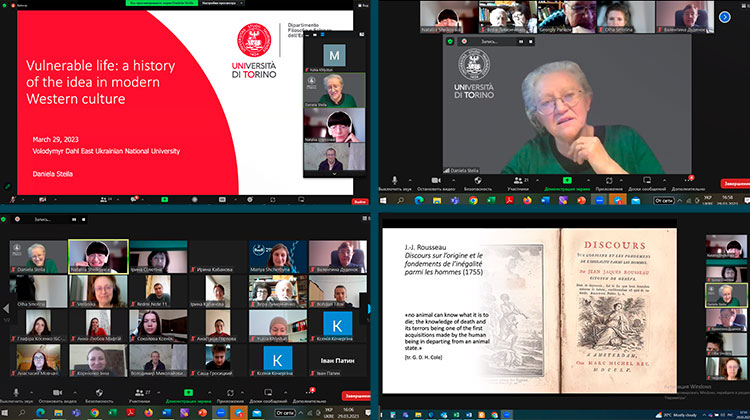Volodymyr Dahl East Ukrainian National University hosted an open lecture by Daniela Steila, a professor at the University of Turin, on “Vulnerable life: a history of the idea in modern Western culture”, based on D. Steila’s recently published book “Morte”. In addition to her reflections on death, which has claimed the lives of thousands of Ukrainians in the war unleashed by Russian authorities in 2022 and has been faced by many people worldwide during the Covid-19 pandemic.
The lecture was attended by professors, graduate students, and students of the lecture organizer – the Department of Philosophy, Cultural Studies and Information Activity, as well as other departments of the University. Among the lecture’s guests were professors from the Kharkiv State Academy of Culture, Kharkiv National University of Internal Affairs, and Drohobych State Pedagogical University.

Prof. Steila started her lecture with a brief historical and philosophical analysis of various philosophers’ (Epicurus, J.-J. Rousseau, G. Hegel, F. Schelling, S. Kierkegaard, M. Heidegger, M. Scheler) development of the idea that the awareness of one’s mortality distinguishes humans from other creatures on Earth.

Therefore, according to D. Steila, the analysis of attitudes towards death and human mortality in different historical epochs deserves special attention: from heroic death as a role model in antiquity, the realization of the unity of life and death as a means of purifying the soul in the Middle Ages, to its complete displacement in the field of science and medicine in the modern world.
It is the realization of the coexistence of life and death that reveals human nature. Forgetting one’s mortality leads to the meaninglessness of true human existence.

Death lives in us; it is natural. Everything that lives dies. If it does not die constantly, every moment as a single process of “dying-birth,” then it is no longer living (regarding the problem of human immortality).

And isn’t it unnatural and unnecessary for a person to prolong their life with medicine when they are suffering incredibly physically? “Recognizing the fragility and vulnerability of life can lead us to a more humane medicine that recognizes that it is not omnipotent and agrees to accompany the patient to the end, respecting their personal values and choices,” says Steila. Moreover, a person is vulnerable not only physically but also psychologically and socially, which is especially acute in conflictual social situations and in the event of the loss of people close to us.

The lecturer cited a remarkable quote from Augustine’s Confessions about his suffering over the death of a close friend.
Instead of an independent, self-sufficient, abstract subject, which philosophy has traditionally placed at the center of reflection, it is vital today to focus on a vulnerable, weak, living person who is naturally dependent on others and needs attention, care, and protection. These are the main ideas of Prof. Daniela Steila’s lecture.

These ideas aroused great interest and lively discussion among the audience.
Prof. Volodymyr (Drohobych Ivan Franko State Pedagogical University), Prof. Pankov G.D. (Kharkiv State Academy of Culture), Prof. Shapoval V.M. (Kharkiv National University of Internal Affairs), Prof. Smolina O.O. (Volodymyr Dahl East Ukrainian National University) took part in the discussion.
In conclusion, the organizer and moderator of the lecture, Associate Professor of the Department of Philosophy, Cultural Studies and Information Activity, Shelkovaia N.V., thanked Prof. Daniel Steila for the wonderful lecture and expressed hope for continued fruitful cooperation between the Department of FCID and Volodymyr Dahl East Ukrainian National University with the University of Turin.










